#football league division two
Explore tagged Tumblr posts
Text

Jack Leslie.
Leslie was the first black footballer to be given an England national football team call up - way back in 1925.
He was selected as a non-travelling reserve.
His manager, "Bob Jack", told him he had been selected as a reserve for England against Ireland for an October 1925 Home Nations Championship game.
However, the invitation to be a reserve for his country was later withdrawn.
It has been speculated that this was because of belated objections to his skin colour by members of the FA who had been unaware of his ethnicity.
Later in life, Leslie told the journalist "Brian Woolnough":
"They must have forgot I was a coloured boy."
#jackleslie#jack leslie#barkingtown#barking town#plymouthargyle#plymouth argyle#footballleaguedivisionthree#football league division three#footballleaguedivisionthreesouth#football league division three south#footballleaguedivisiontwo#football league division two#canningtown#canning town#london#england#unitedkingdom#united kingdom
1 note
·
View note
Text
Mickey Andrews
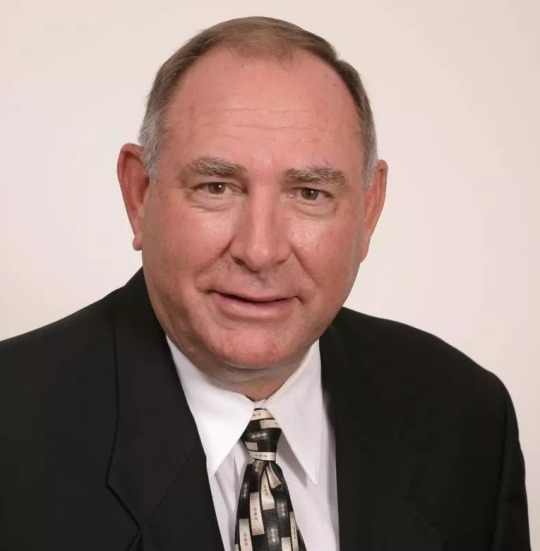
Physique: Husky Build Height: 5' 10"
Mickey Andrews (born May 20, 1942) is a former American football coach. He is most known for his tenure as the defensive coordinator at Florida State for 26 seasons, from 1984 to 2009, under head coach Bobby Bowden. Andrews also served as the head football coach at Livingston University—now known as the University of West Alabama from 1970 to 1972 and at the University of North Alabama from 1973 to 1976.
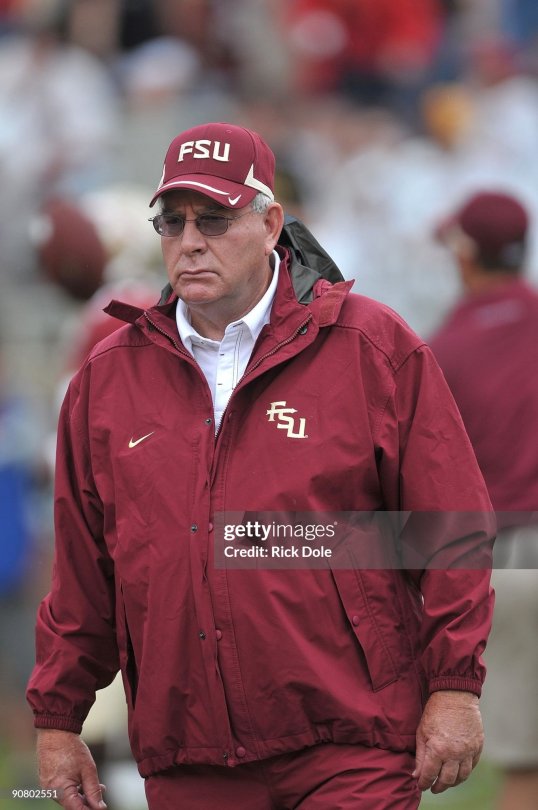
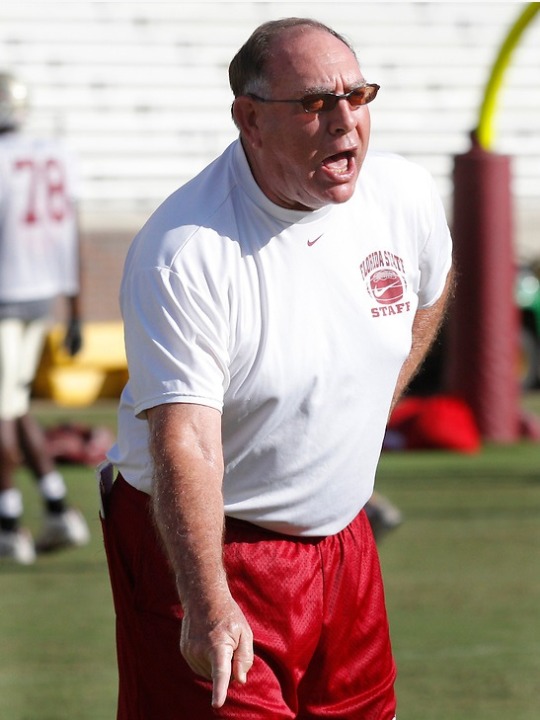
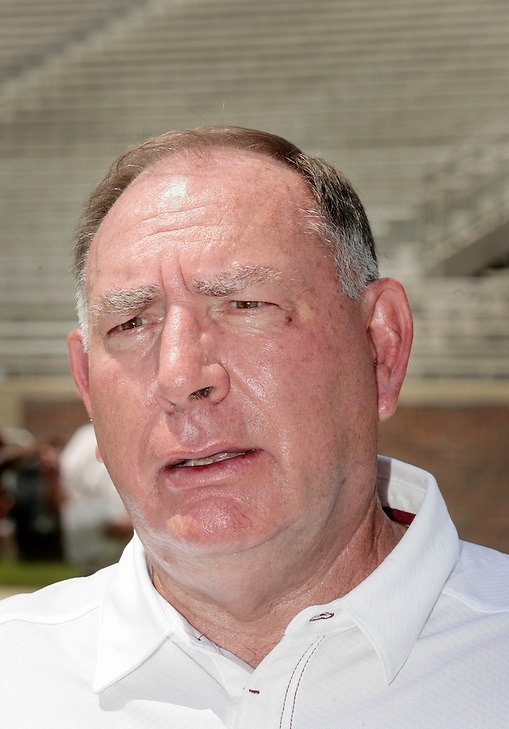
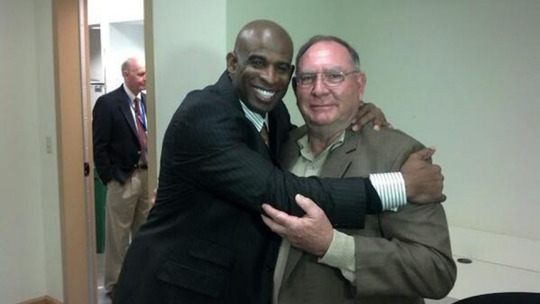
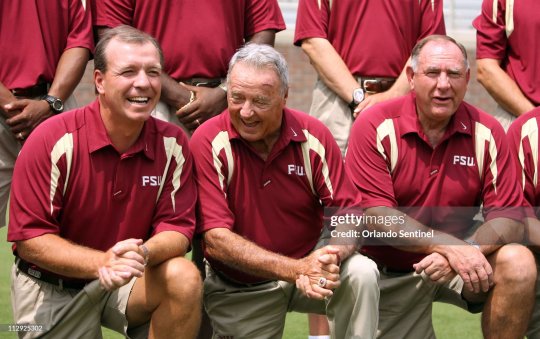
At one time, Florida State had the hottest coaching staff under head coach Bobby Bowden. And Andrews #2 behind him. Mmm… Seems like he'd be real fun in bed. Shame I only noticed him after he and Bobby retired.
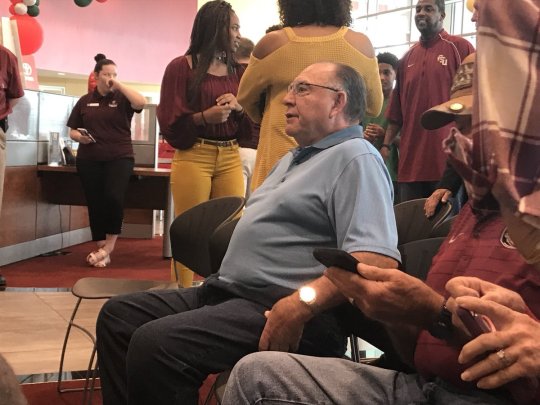
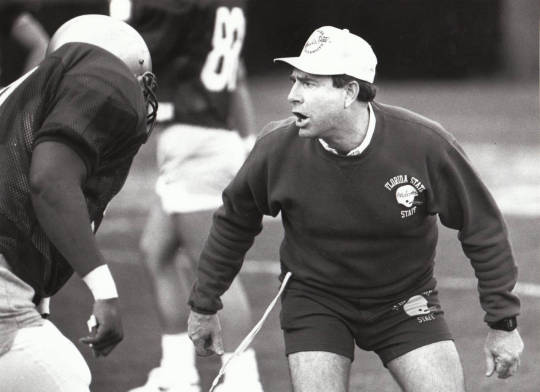
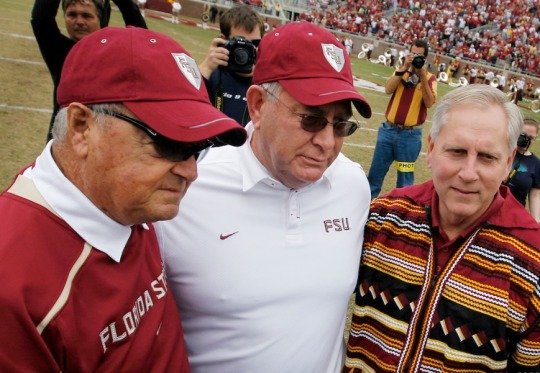
A native of Daleville, AL, Andrews attended the University of Alabama, Andrews earned second-team All-America honors as a wide receiver and defensive back. Andrews was also on two Alabama national championship teams (1961 and 1964) and played in three New Year's Day bowl games. In college baseball, Andrews was an All-SEC choice. In 1964, he received the Hugo Friedman Award as Alabama's best all-around athlete. Under Andrews, Florida State became the top producer of All-America and National Football League caliber cornerbacks in the nation.
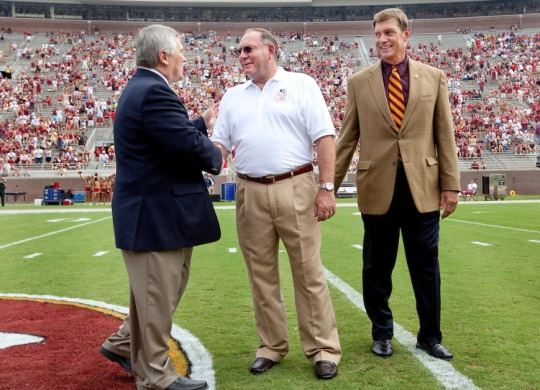
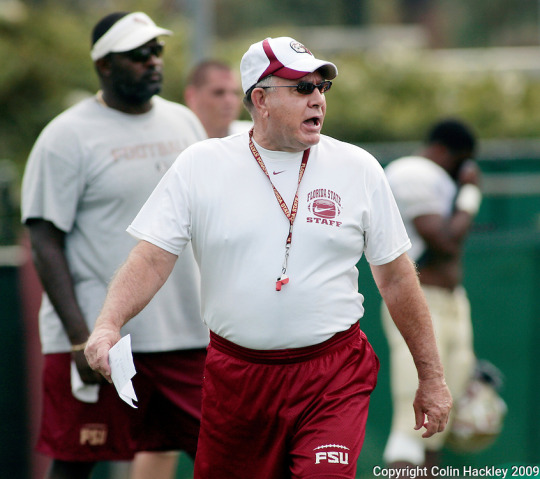
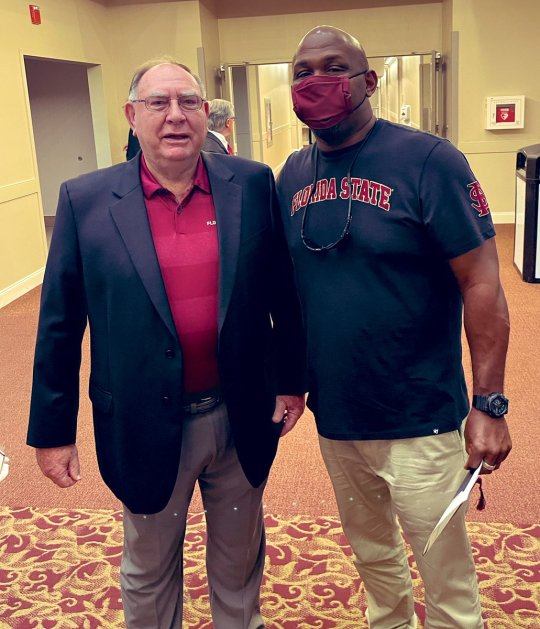
Andrews was married to Diane, who died in 2012 of complications from stomach cancer. The couple had two children: Ronald David, Shannon Nicole and five grandchildren. Andrews still lives in Tallahassee. Since he might be single now, I should maybe take a trip to Tallahassee.
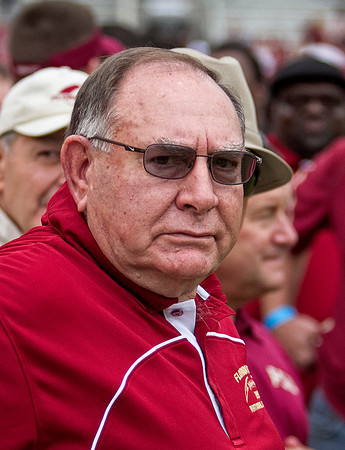
Head Coaching Record Overall: 41–28–3 (college) Tournaments: 2–1 (NAIA D-I playoffs)
Accomplishments and Honors Championships NAIA Division I (1971) GSC (1971)
Awards Broyles Award (1996) GSC Coach of The Year (1971) Second-team All-American (1964)
64 notes
·
View notes
Text

series masterlist! AO3!
EXTRA, EXTRA! - ROY KENT.
PROLOGUE OF ACES AT THE WATER'S EDGE,
author's note: fun little article intro bc retrospective context is so lovely. and it gave me an excuse to graphic design is my passion this fic. let's pretend this was always a part of the masterlist, okay? love ya -mags
AFC Football Club West Ham just made the shocking announcement that they will be no longer working with their newly acquired, American assistant coach.
The Coach, affectionately nicknamed "Mean Fourteen" due to her record-breaking performance that led the United States to win the Women's World Cup in 2015, made history just three months ago, being the first woman to ever join an AFC coaching staff. Now, before the season even begins, it appears we'll no longer be seeing her on the sidelines.
West Ham did not detail the circumstances of this departure, citing only "unfortunate leadership differences" in their press release to the public this morning.
This comes directly from West Ham Chairman Rupert Manion, who released a statement on behalf of the Club.
"We are deeply saddened to announce that we have parted ways with our new assistant Coach," said Manion. "This was [. . .] an amicable decision reached by both parties. Despite her only being with us for three months, her contributions to the team were invaluable. While we are still reeling from this loss of talent, we have full confidence in the abilities of our coaching staff, led by the Wonder Kid himself, Nathan Shelley. We look forward to seeing their hard work, as well as the team's, pay off going into this exciting season."
This has come as a surprise to all, as Fourteen's positive reputation as both a teammate and a coach has proceeded her thus far, and made her a prime candidate for breaking into the Men's League.
"It's what made me so excited about her," said West Ham star and Captain Tom MacDonald when asked about his former Coach's legacy. "Not many people can do what she did as both a player and a coach. It's a shame she won't be around. I'll miss seeing her every day, but I suppose everything happens for a reason."
Fourteen, who left her mark on Women's Football as an integral part of USA's gold-medal win at the 2012 London Olympics and the notable, and memorable star of the 2015 Women's World Cup, also managed to coach her NCAA Division I team to four victory titles within the span of six years.
With such an impressive resume, it's left football fans scratching their heads as to what "leadership differences" could have been at play here, especially with just under two weeks to go before the regular season starts.
The Standard has attempted to reach out to Fourteen and her representatives for a comment, but they have not responded at this time.
This is breaking news, and we will be updating this story as we learn more information.

#EXTRA EXTRA READ ALL ABOUT IT!#we love retrospective context#aatwe#aces#roy kent x reader#roy kent x you#roy kent fanfiction#roy kent fic#ted lasso#ted lasso fanfic#roy kent#the one who can't walk up stairs
56 notes
·
View notes
Text

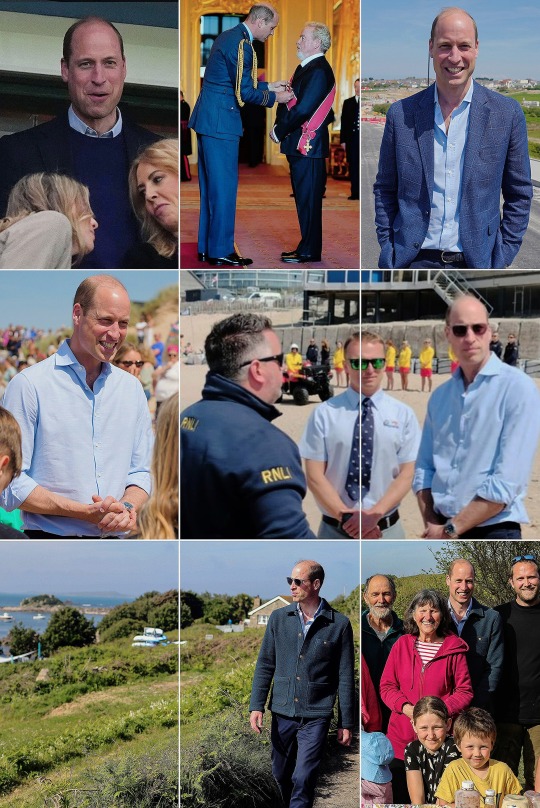
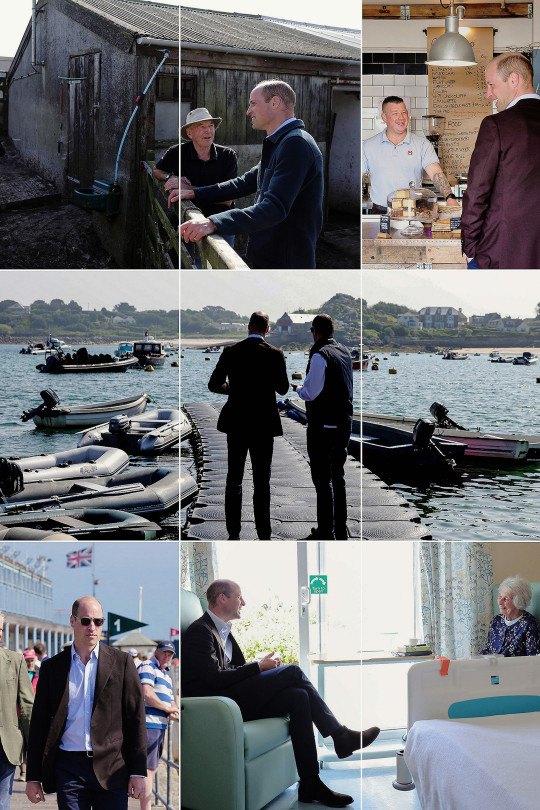
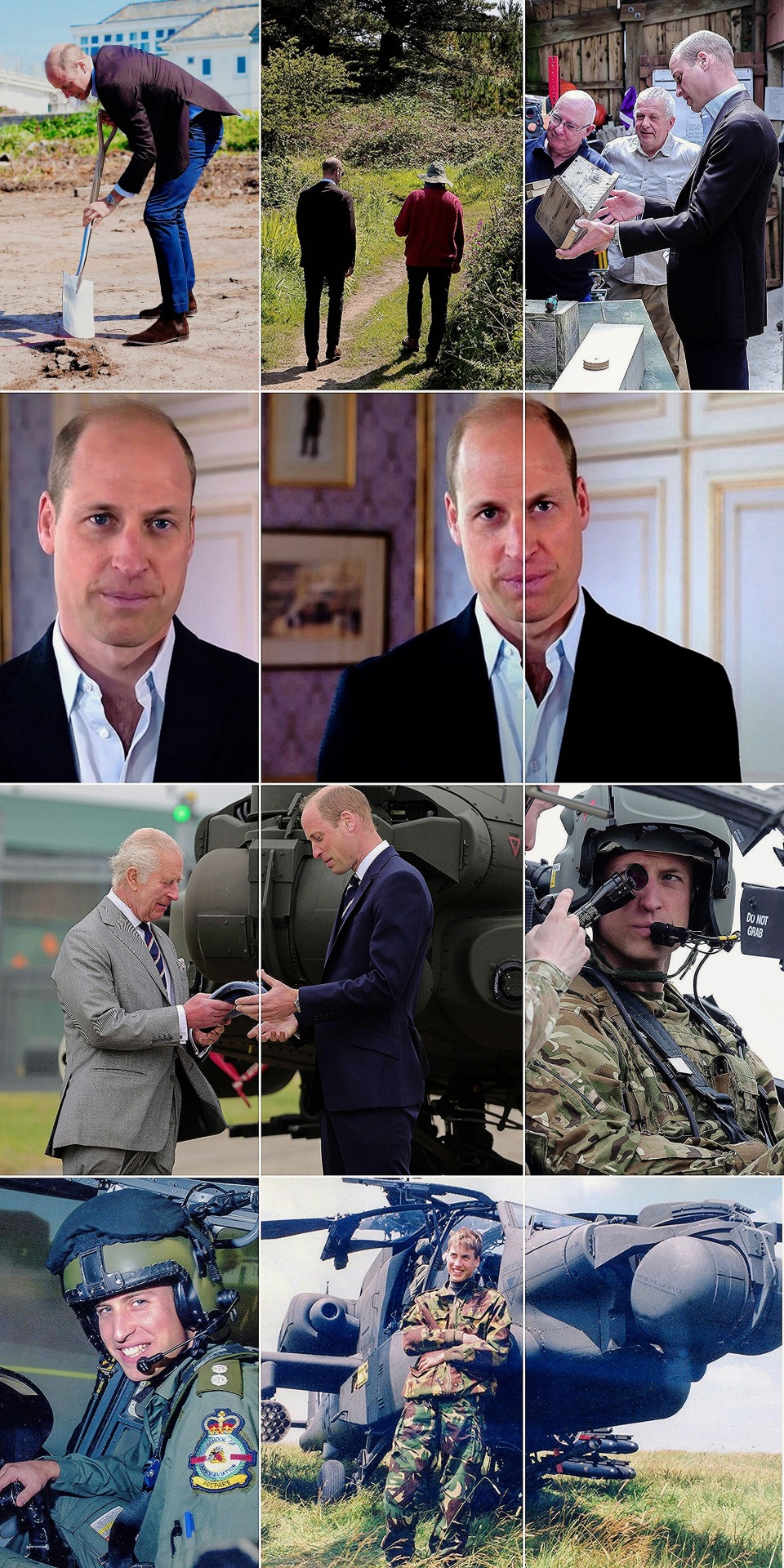
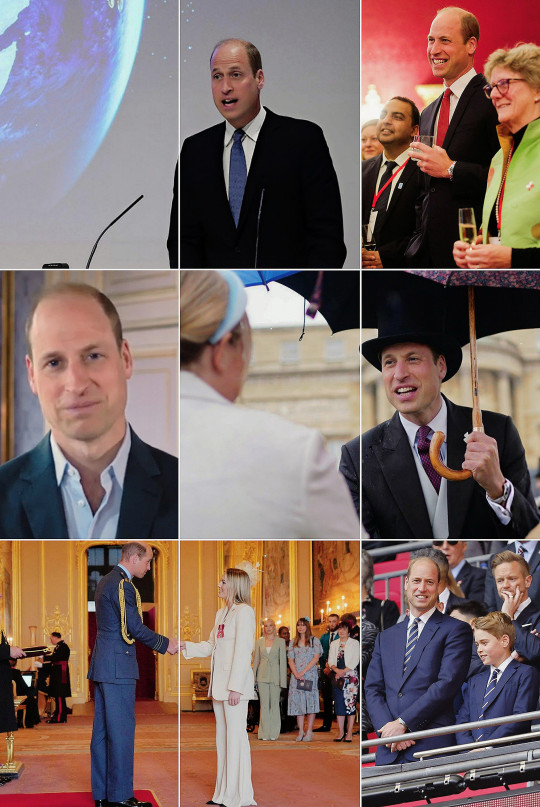

─ •✧ WILLIAM'S YEAR IN REVIEW : 𝐌𝐀𝐘 ✧• ─

𝟏 𝐌𝐀𝐘 : The Prince of Wales received Mr. Simon Patterson (Vice Chairman, The Royal Foundation) at Windsor. William supported Fields in Trust's #BarkForOurPark Campaign. 𝟐 𝐌𝐀𝐘 : He attended the UEFA Conference League Semi-Final first leg match between Aston Villa & Olympiakos at Villa Park. 𝟕 𝐌𝐀𝐘 : William received the Lord Janvrin (Chairman, The Queen Elizabeth Memorial Committee) at Windsor Castle. He received the Lord Hague of Richmond (Chairman, The Royal Foundation) at Windsor Castle. 𝟖 𝐌𝐀𝐘 : William held an Investiture at Windsor Castle. 𝟗 𝐌𝐀𝐘 : The Duke of Cornwall started his two-day tour of the Duchy of Cornwall. He spent the day in Newquay and was received by His Majesty's Lord-Lieutenant of Cornwall (Colonel Sir Edward Bolitho) at the site of the new Nansledan Housing Project. Afterwards, he met lifeguards and volunteers of the Royal National Lifeboat Institution at Fistral Beach. He met representatives of the Hollywell Bay & Newquay Surf Life Saving Clubs. Later, he arrived at St Agnes in the Isles of Scilly where he visted Troytown Farms & spent time with the community during a picnic. 𝟏𝟎 𝐌𝐀𝐘 : William spent the day in Isles of Scilly. He was received by Mrs. Jane Hartley (Deputy Lieutenant of Cornwall) at the Quay, St. Mary's. He visited St. Mary's Harbour and met crew from the 2024 World Pilot Gig Championships. Later, he visited St. Mary's Hospital in Belmont. The Duke of Cornwall also privately took part in a nature walk with Isles of Scilly Wildlife Trust. 𝟏𝟏 𝐌𝐀𝐘 : He appeared in a video message during the Steve Irwin Gala. 𝟏𝟐 𝐌𝐀𝐘 : William appeared in a video message during BAFTA TV Awards. He sent out a tweet congratulating Manchester United WFC on their Vitality FA Cup Win. 𝟏𝟑 𝐌𝐀𝐘 : The Prince of Wales was officially appointed as the Colonel-in-Chief of the Army Air Corps by King Charles III. Subsequently, he visited the Army Air Corps at the Army Aviation Centre. Kensington Palace released two unseen photos from 1999 and 2008 featuring William to mark the occasion. 𝟏𝟓 𝐌𝐀𝐘 : William released a personal tweet congratulating Aston Villa for their Champions League qualification. 𝟏𝟔 𝐌𝐀𝐘 : William attended "World Together Solving the Antibiotic Emergency" Conference at the Royal Society and was received by Deputy Lieutenant of Greater London (Reverend Canon Dr. Flora Winfield). Later in the evening he hosted a Reception at St. James's Palace. William also appeared in a video message to mark the 10th anniversary of the Elephant Initiative. 𝟏𝟕 𝐌𝐀𝐘 : Kensington Palace marked Mental Health Awareness Week via social media. Additionally, the Duchy of Cornwall unveiled funding plans of the Duchy Mental Health Strategy providing their farmers with access to support. 𝟐𝟏 𝐌𝐀𝐘 : The Prince of Wales received Major General James Bowder (General Officer Commanding London District and Major General Household Division, Welsh Guards). In the afternoon, he hosted a garden party at Buckingham Palace. 𝟐𝟐 𝐌𝐀𝐘 : William held an Investiture at Windsor Castle. 𝟐𝟓 𝐌𝐀𝐘 : William and Catherine released a personal tweet offering condolences on the passing of an RAF pilot at RAF Coningsby. William and George attended the Emirates FA Cup Final between Manchester City Football Club and Manchester United Football Club at Wembley Stadium. He also send out congratulations via a tweet. 𝟐𝟕 𝐌𝐀𝐘 : William and Catherine sent a letter to Tracey Morris offering condolences for her husband, Peter's death. 𝟐𝟖 𝐌𝐀𝐘 : William and Catherine were out shopping at a deli in Holt, Norfolk.

#review 2024#year in review : william#year in review : 2024#year in review 2024 : may#william review : may#review may#year in review 2024 : william#prince of wales#the prince of wales#prince william#william prince of wales#brf#british royal family#british royals#royalty#royals#royal#british royalty#royaltyedit#royalty edit#my photoset#will edit#13052024#king charles iii#king charles lll#photoset#princess of wales#the princess of wales#princess catherine#princess kate
40 notes
·
View notes
Text

The 36-year-old Press, a two-time World Cup champion who just signed a one-year contract to stay with the club, began her pro career in Boca Raton, Florida. She played for magicJack, a club that lasted one season in the now defunct Women’s Professional Soccer league: “A lot of toxic and unprofessional things went down there; it was a ‘wow’ moment for me.”
From there she moved to Sweden, and she had a wonderful experience playing in the country’s top division, where her team shared a “dark, dingy” locker room with a boys’ team.
And then she was in Chicago, playing for the nascent NWSL’s Red Stars, on a Benedictine University’s football field in the suburbs. “You might have a coach today, your coach might not show up tomorrow, you’re playing on a college football turf for your games,” Press said. “You don’t have staff, you don’t have a GM, you don’t have a collective bargaining agreement, you don’t have an HR department. …
“All of the things that we didn’t have became a daily grind for me to try to convince often-male leadership that we needed,” said Press, who was among the U.S. Women’s National Team members who won equal pay. “To be told that I was demanding and be told that I was the squeaky wheel. It’s not easy to be a woman advocate. …
“[But] it is our duty, our responsibility and it’s something that brings us great joy, to make the game better for the future. And it has been a great burden, one that all of the work that we’ve done is so that the next generation doesn’t have to do the same.”
The beat goes on: “It’s like, yes, you care about the crest,” Press said. “Yes, you care about the city and the team and a sport. But there’s a larger thing that everyone’s fighting for, and I really feel that there’s a synergy between soccer and basketball particularly in the last few years in this country. In the W, they’re getting the respect and the coverage that is getting closer to what they deserve, and that’s really, really powerful and important thing for women’s soccer, too.”
Angel City raises the bar with upgraded training facility
THOUSAND OAKS — This is awesome! It’s about time.
This is so great! But what’s next?
That’s where we’re at with this women’s sports boom.
There’s a steady drumbeat of groundbreaking achievements: Just in the past few days, soccer star Naomi Girma agreed to move to English side Chelsea for a world-record women’s transfer fee of $1.1 million. In the WNBA, Caitlin Clark’s Indiana Fever announced plans to improve on their previous team-dedicated digs with a new $78 million training facility.
And Tuesday in Thousand Oaks, the ribbon-cutting ceremony for the new Angel City Performance Center, the largest dedicated training facility in the National Women’s Soccer League.
And as the beat goes on, it’s just hammering home many things at once: Yay, progress! But, wow, have women athletes had it tough. And, dang, there’s still so much more work to do. But, yes, let’s goooo – and let’s keep it going.
It’s a lot to digest, so it’s small wonder that veteran standouts Ali Riley and Christen Press got emotional Tuesday talking about their new workplace. Or that their teammates did too this week the first time they toured their new performance center, a reimagined facility on the upper crest of California Lutheran’s campus, space the Rams occupied for eight years before their move to Woodland Hills last summer.
Matt Wade, Angel City’s assistant general manager, recounted how the big reveal elicited screams and tears when players saw their spacious new locker room, where lockers are twice the size as those they used before in temporary trailers down the hillside.
And then there’s the film room, with a projector screen and stadium seating – no more tall people in the back so everyone can see the TV.
And the massive weight room! What was fit for one professional football team is fit for another.
Sean McVay’s old office? Kids space now, where children can safely play while their moms are at work nearby.
Also: a 5,400-square-foot gym, a medical treatment and hydrotherapy area. And, where the Rams used to practice, a full soccer pitch and adjoining half field.
It’s a clever remodel, functional and stylish; from floor to ceiling it’s in keeping with the club’s distinctive asphalt-and-sol rosa color scheme. A spokesman for the team didn’t want to reveal a price tag, but the L.A. Times’ report that it was in the multimillions seems right.
And it all means so, so much to players like Riley and Press, native Angelenos who have experienced about everything in their soccer lives.
The 36-year-old Press, a two-time World Cup champion who just signed a one-year contract to stay with the club, began her pro career in Boca Raton, Florida. She played for magicJack, a club that lasted one season in the now defunct Women’s Professional Soccer league: “A lot of toxic and unprofessional things went down there; it was a ‘wow’ moment for me.”
From there she moved to Sweden, and she had a wonderful experience playing in the country’s top division, where her team shared a “dark, dingy” locker room with a boys’ team.
And then she was in Chicago, playing for the nascent NWSL’s Red Stars, on a Benedictine University’s football field in the suburbs. “You might have a coach today, your coach might not show up tomorrow, you’re playing on a college football turf for your games,” Press said. “You don’t have staff, you don’t have a GM, you don’t have a collective bargaining agreement, you don’t have an HR department. …
“All of the things that we didn’t have became a daily grind for me to try to convince often-male leadership that we needed,” said Press, who was among the U.S. Women’s National Team members who won equal pay. “To be told that I was demanding and be told that I was the squeaky wheel. It’s not easy to be a woman advocate. …
“[But] it is our duty, our responsibility and it’s something that brings us great joy, to make the game better for the future. And it has been a great burden, one that all of the work that we’ve done is so that the next generation doesn’t have to do the same.”
The facility upgrade should help a club recruit and retain talent – and a permanent head coach, said new sporting director Mark Parsons, who insisted he won’t rush his search for the right replacement for Becki Tweed, who was ousted after Angel City went a disappointing 7-13-6 last season.
“It’s going to be very hard,” he said, “for people to not want to be in this environment.”
What’s an advantage should be the standard, said Willow Bay, who last July became a controlling owner of the club with her husband, Disney CEO Bob Iger.
“It sets the bar,” said Bay, the dean of the USC Annenberg School for Communication and Journalism. “But it really should be the norm.”
Around the NWSL and the WNBA (ahem, @LASparks).
The beat goes on: “It’s like, yes, you care about the crest,” Press said. “Yes, you care about the city and the team and a sport. But there’s a larger thing that everyone’s fighting for, and I really feel that there’s a synergy between soccer and basketball particularly in the last few years in this country. In the W, they’re getting the respect and the coverage that is getting closer to what they deserve, and that’s really, really powerful and important thing for women’s soccer, too.”
23 notes
·
View notes
Note
The transfer season has been wild and rightfully it should be. But at the end it also showed how the fans care for the players ( ignoring the haters). Like the fans wanting the players to stay and fight for the clubs. For instance ingrid is not as popular as alexia or aitana but seeing the majority of fans wanting her to stay is so sweet and acknowledging what she did last season. And like lia walti rumour to real madrid was wild too. Lia is an underrated player and her plays almost get no attention and she is also not the face of the arsenal but the gooners fans almost lost it hearing the rumours because of how important she is. I hope these players even if they leave or stay at the club ,hope they know that the fans love them ( there will always be haters, we just ignore them)
yes, i think that's a really positive way to look at all the mess and confusion over the past few days. there's a lot of passionate fans that want the best for their favourite players but also that they stay at the club too.
and as long as they are not attacking other players or disparaging people that have nothing to do with the situation, then there's nothing inherently wrong with that type of passion! 🙏
and lia wälti to real madrid has to be one of the funniest rumours that's circulated around this league 😅

yes, it's fair. it's allowable under the rules. now i answered a similar ask earlier here. i think the real question we should be asking is why aren't other teams making attractive offers to these players. and why are only a handful of teams spending money on players? 🤔
and when you say these teams can't afford it, are you sure about that? because a lot of these teams are spending big money, it's just not on women's football. to me, that is the issue across the board. let's take two of the biggest names in football: real madrid and manchester united are spending a lot of money. they just choose not to spend on women's football.
so instead of criticising barça and chelsea, we should put our efforts into pushing the other teams to catch up! 😤

thanks anon - putting this out there as a call to pay attention to the lower leagues. and this goes for spanish football in the sense that if you watch the division below liga f, you get to see the barça b team babies compete and who has potential to join the first team too! 🙏
#fandom in a nutshell#fandom culture#fcb femení#futfem#woso#women's championship#barça b babies#financial fair play rules
19 notes
·
View notes
Text
𝗵𝘂𝗴𝘀 𝗮𝗻𝗱 𝗸𝗶𝘀𝘀𝗲𝘀 - 𝘀.𝗸𝗮𝗿𝗰𝗵𝗼𝘂𝗶



summary: even after a year of dating, playing against your girlfriend doesn’t get any easier
𖦹 masterlist
𝗜𝗧 𝗪𝗔𝗦 𝗔 𝗡𝗘𝗥𝗩𝗬 day to say the least.
one of my least favourite days during the season. i had to go up against sakina.
it was psg vs lyon, and both me and sakina were in the starting eleven for our respective teams.
we started dating last year. both of us got called up for national team duties, to represent france in the world cup. that was when we first properly met and, thanks to elisa, started dating.
elisa and i met when i was on loan to montpellier in the 2020/21 season. since then we'd kept in touch often.
now in the 2023/24 season, sakina and i had been together for a whole year and two days. we had celebrated our anniversary with a recreation of our first date, same restaurant and everything.
but during the season, there was a few times where we came up against each other. whether it be for the champions league or the french division, it had to happen.
i always got nervous about these games because the little voice in my head would tell me that something might change between us after we played. nothing had ever changed in the year we'd been dating and come up against each other it that didn't stop me from over thinking.
——
on the pitch, i could see both sakina and elisa ready and waiting in the psg defence for the whistle to blow.
when it did, i was the first to shoot forward with the ball. being a striker didn't help when your girlfriend was a defender. there was bound to be some tackles involved.
and eventually it did.
in the 70th minute, both me and sakina had stayed on, as expected.
i was running down the middle of the field, having intercepted a pass from two of the psg strikers. i ducked and weaved through the defenders and i was almost at the edge of the box when i noticed sakina out of the corner of my eye.
just as i took the shot at the goal, sakina came sliding in and took my ankles out.
i landed on the ground with a thud and all the air left my lungs. i didn't move for a while, just trying to get my breath back, but then the medics came rushing in.
i didn't think i needed them but let them do their thing anyway.
i could see sakina standing nearby, trying to see if i was okay. i was but i was a bit mad with her. she didn't have to take my ankles with her in her attempt to clear the ball.
when the medics cleared out and i stood up, sakina came up to me.
"what the hell was that for?"
i spoke first. i knew that it was a game and she had to defend but that tackle really took the life out of me for a bit there.
"i'm sorry, i didn't mean to take you out too."
"whatever. let's just play the game."
i walked away and returned to my position. the game went on and lyon ended up winning 3-0 including the shot that i got in before sakina tackled me.
after we won, most of the girls did a couple laps to greet the fans. i made a couple laps before heading back to the lockers. freshly showered and dressed in the clothes i arrived in, i walked back into the communal hallways.
however, just as i was walking out, sakina walked in and she whisked me into an adjacent room.
that room happened to be a physio room, thank goodness no one was in there.
"yn, i am so sorry about the tackle. i truly did not mean to take you down like that. if i could go back and change anything, i probably wouldn't make that tackle at all."
that last bit stunned me.
"you'd let me take the goal?"
"yes."
"really?"
"yes, yn. i'd rather loose a game of football than have you injured. please forgive me."
i didn't see how i could still be mad at her after that so of course i forgave her. i nodded at sakina and was about to verbalise my feelings when she kissed me.
her lips were soft as always and she easily slipped her tongue into my mouth.
i tried to keep it pg, so pulled away after a bit with a grin.
"let's wait until we're home to start something like this, yea amour?" (love.)
#woso#woso x reader#woso community#sakina karchaoui#sakina karchaoui x reader#sakina karchaoui imagine
84 notes
·
View notes
Text
Ellie Carpenter calls out online abuse but shrugs off her own
“The bigger you get, the more criticism you get.”
Ellie Carpenter is authorised to speak on this subject. Mainly because her football career has got real big, real quick – she is 23, has been playing for global powerhouse Lyon for three years, and been the Matildas’ undisputed starting right-back for even longer.
But also because the peak of that career – playing in a World Cup semi-final in her home country – brought with it criticism which would more accurately be described as abhorrent social media trolling.
It happened in August, when Carpenter failed to clear a long ball that resulted in England’s second goal of the Lionesses’ 3-1 win. It was a mistake that left her visibly “heartbroken” after the match, but it did not warrant what former Socceroos captain Craig Foster described at the time as “vile, misogynistic garbage”.
The abuse forced her to limit replies on social media, which were also flooded with supportive messages from fans, friends and teammates, including captain Sam Kerr, who told media she was “mentally one of the toughest kids I’ve ever met in my life”.
Sometimes it is hard for an outsider to know how much this “outside noise” – as many sports people, including Carpenter, call it – affects the individual at its centre. For some, it can devastate mental health and on-field performance. If that is the case with Carpenter, you wouldn’t know it.
Two months after the World Cup, she has been back in the thick of it with Lyon, who are once more top of France’s Division 1 Feminine table, and is now back in Australia answering questions about online abuse she would probably rather not be answering.
“To be honest, I don’t really read or look into that,” she says in Perth, where the Matildas are preparing to play three Olympic qualifiers.
“It doesn’t really affect me at all, because I do a job for my team and myself. I don’t really listen to outside noise. I had a great support system around me during that time, and just during the whole World Cup really.
“It [online abuse] is everywhere these days, and that just shows that the bigger you are, or the bigger you get, the more criticism you get. That comes with being a professional athlete as well.
“You see it everywhere in different leagues, different sport codes. So obviously it’s a problem, and I know a lot of people are trying to make apps and platforms to try and stop abuse and things like that, so that’s good that people are aware of it and are trying to change it.”
Carpenter is an old, independent soul for her 23 years. When she contested the World Cup, she did so after recovering from an ACL rupture, in another country, and opting for little personal support except from her partner and teammate, Dutch international Daniëlle van de Donk.
“You have to grow up very quickly,” she says. “I moved out of home when I was 15 and was living by myself, so you grow up automatically.
“I didn’t really get much downtime [after the World Cup]. You just kind of go straight into a new season, so you don’t really have time to reflect or stop for a second.
“But it’s been incredible to see the aftermath of the World Cup and what we’ve done in football and Australia, and for women as well. I can definitely be proud of that.”
Carpenter is allowing herself to enjoy her time in Perth. She was released early by her club and arrived over the weekend, so enjoyed a couple of extra days to recover from jet lag.
75 notes
·
View notes
Text
Professor Neil (sneak peek)
I missed the guy and WIP Wednesday this week brought him back up so here's a lil gift for @jtl-fics for being amazing and closing on a condo today!!
(Snippet includes part of the WIP Wednesday piece in the beginning)
September 16, 2008 (Tuesday)
Tuesday was probably Neil’s favorite day of the week. He only had two classes in the morning and both were lectures that he didn’t mind sitting in. After his lectures, he always went to the small coffee shop that didn’t even serve good coffee, but it was cheap and it was routine. Routines helped and kept him focused. Besides, the coffee shop was the only one that hadn’t tried to demand proof of papers for his service dog. One would think that the prosthetic leg would be proof enough but Neil clearly overestimated the mental capacity of most people.
Armed with subpar coffee and a warm bagel, Neil made his way to the library. The main floor was a communal hub, with no volume limits and plenty of chairs and couches for people to sit on. Tucked on the left side was an open room full of tables, the tutoring center. The woman behind the desk smiled as Neil walked up and wrote down his arrival in a notebook. Neil liked tutoring oddly enough, he didn’t care much for the people, but he enjoyed the subjects and the feeling of someone understanding a difficult concept was hard to beat.
A good chunk of the people who frequented the tutoring center were those who were on big time scholarships and unwilling to risk a dropping a point in the GPA. Hyped up on coffee, Neil often had to fight them away from his preferred table. The largest portion however, were the athletes. All required to maintain a minimum of a 2.3 to play for the NCAA Division 1 league. Neil tutored football players, soccer stars, and dancers every day. For most, as long as they went to their classes and didn’t fail any exams, it was an easy gig. Five hours a week in the tutoring center was a easy gig.
The Exy team was no exception.
Neil had started tutoring Matt Boyd last year, the tall man hopeless with his French courses. His pronunciation was leaps and bounds better, and the backliner was steadily maintaining a passing grade in the class. Languages were difficult for athletes who traveled almost weekly for games.
Thankfully, there was no one at the table Neil had claimed as his own. Despite the years of therapy he still took a table in the back of the room. There were other reasons, which his therapist had been good to point out, the fact that being further back in the room kept his dog focused on the task. Babe Ruth was a large golden retriever who seemed to forget that he had an additional appendage attached to his rump. The dogs tail was a weapon, thumbing hard enough against a leg to leave bruises. It was a disappointing scenario, considering Babe Ruth walk to the right side of Neil—tail smacking against his good leg. At the table, Neil took care to sit with his back to the side wall rather than the back. It was the little things, his reminded himself mentally. By now, his voice in the tutoring center was easily ignored as he commanded Babe Ruth to lay at his feet. The dog wasted no time, flopping onto the hard carpet and splaying out his limbs.
Neil checked his watch, Matt would be arriving in a few minutes. He always came right after his French class. Neil had managed to arrive a little early, so he went ahead and pulled out the workbook and folder that they’ve been using over the semester. This was their fourth meeting and already Neil liked how they were able to review the French that had just been covered in Matt’s class. He made a mental reminder to email his thanks to the French Professor, she’d been helpful in sending Neil her presentations for the classes.
#aftg#all for the game#andreil#andreil fanfic#andrew minyard#neil josten#pint writes#pints wips#professor neil#professor neil josten au#prof neil prequel#service dog#neil has only one leg#I stole it#dont worry there's another teachers AU called neil but with both legs in my docs#I just love this lil guy
84 notes
·
View notes
Text



𝗚𝗔𝗠𝗘 𝗢𝗙 𝗧𝗪𝗢 𝗛𝗔𝗟𝗩𝗘𝗦
Two teams, two squads, two managers, one city. Who would be the king of King's Landing and of the Premier League — the long-reigning Sky Blues or the underdog Red Gunners? For Rhaegar Targaryen, the stakes went beyond football, though the game had been his lifeblood, his passion, and his purpose. He never forgot where he had started: a frightened child fighting for his life in a hospital bed. Back then, it hadn’t been the thrill of the game that saved him, but the unwavering smile of a blue-haired girl who had given him a reason to fight.
𝙍𝙝𝙖𝙚𝙜𝙖𝙧 𝙏𝙖𝙧𝙜𝙖𝙧𝙮𝙚𝙣
Rhaegar Lucaerys Aelon Targaryen, former footballer turned manager, is the current coach of Premier League's King's Landing City. As a striker, he achieved legendary status with Royal of Dragonstone, winning six UWEFA Champions Leagues and three World Cups before retiring at 28. Transitioning into management, he first assisted Barristan Selmy at Royal, securing major titles, and later at Inter Lannisport, where they dominated Serie A. At 30, Rhaegar took over Inter, winning every competition during his two-year tenure. By 33, he transformed King's Landing City into a global powerhouse, earning a clean sweep of trophies and becoming one of the most respected managers in history. However, at the peak of his career, at 36, he encountered an unexpected rival—someone from his past who challenged his invincibility.
𝙇𝙮𝙖𝙣𝙣𝙖 𝙎𝙩𝙖𝙧𝙠
Lyanna Aleksander Rickardevna Stark, former footballer turned manager, is the new coach of Flea Bottom's Red Gooners in King's Landing. As a striker for Dinamo Winterfell, her promising career was cut short by a knee injury at 21. Transitioning into management, she became the assistant and later wife of her former coach, Sallador Saan. Together, they achieved success at FC Braavos, leading the team from the second division to winning the Essos Club Cup and the first division title, and at AC Jade Sea, where they won the Essos Confederation Cup. At 27, Lyanna returned to manage Dinamo Winterfell’s men’s team, guiding them from near relegation to Northern League champions and eventually winning the Club World Cup. After her husband’s sudden death, she took a three-year sabbatical before accepting the role at Flea Bottom, beginning a new chapter as the Red Gunners’ manager. She never thought she’d find him there.
𝗪𝗔𝗥𝗡𝗜𝗡𝗚𝗦 :
Alternate Universe - Sports | Alternate Universe - Football |Real football not the abomination Americans call football | Idiots in Love | Childhood Memories | Alternate Universe - Childhood Friends | Rhaegar Targaryen has OCD | Childhood Sweethearts | Sick Character | Implied/Referenced Suicide | Not of the main leads | Fluff and Angst| Eventual Smut| Alternate Universe - Romantic Comedy Second Chances
#game of two halves#game of thrones#a song of ice and fire#football#got#asoiaf#lyanna stark#house stark#rhaelya#house targaryen#rhaegar targaryen#lyanna x rhaegar#house of the dragon#rhaelya fic#au#romcom
10 notes
·
View notes
Text
Women’s safety is more important than men's gender feelz
By Genevieve Gluck April 2, 2024
Recent landslide victories secured by a women’s football team with five trans-identified male players have sparked controversy, leading one club manager to reveal that at least 20 female players have excluded themselves from the sport in recent weeks in order to avoid competing against the men.
Frank Parisi, president of St. Patrick’s Football Club, spoke with Reduxx and revealed a range of problems that had arisen as a result of men playing in women’s football matches, as well as an incident in which a female player’s leg was broken in two places.
The Flying Bats Football Club in North West Sydney, Australia, has on its team five males who identify as transgender. The team was awarded a $1,000 prize after winning the North West Sydney League pre-season Beryl Ackroyd Cup on March 24, following a season of winning every game they played in the Women’s Premier League matches, 10-0.
As previously revealed by Reduxx, one of the five men on the women’s football team is trans activist Riley Dennis, who was previously accused of severely injuring women while participating on another women’s team. However, the problems created by the male players on The Flying Bats team aren’t limited to safety risks and fair sport for women. Female players have been self-excluding from the sport by the dozens, says Parisi, in order to avoid competing against the trans-identified men.
The information first came to light when an audio recording of Parisi speaking during a meeting on the evening of March 20 was leaked on social media.
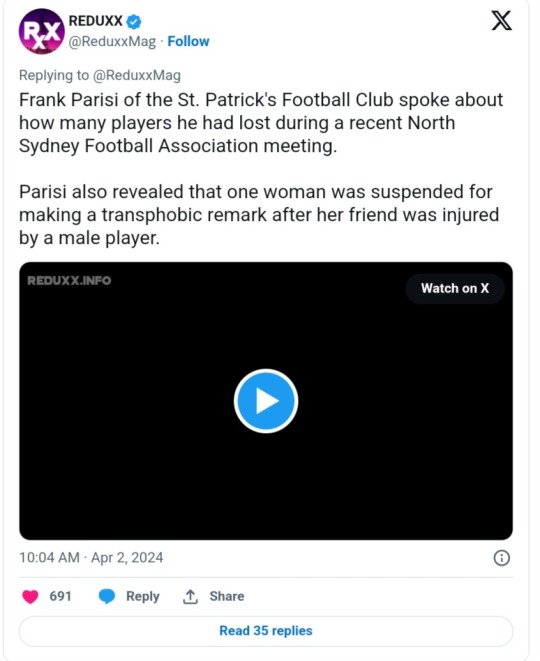
The meeting, held at Christie Park, was organized by the Northwest Sydney Football Association in response to an informal discussion among football club presidents that had taken place three days prior. That initial gathering was convened on March 17 in order to address “concerns around how implausible it has become for any team to win against the Flying Bats as well as physical safety concerns.”
In the audio clip, Parisi can be heard describing an incident that took place “a couple of years” prior in which a female player was so severely injured by a trans-identified male player that she was no longer able to participate in the sport.
“A couple of year ago, one of the Flying Bats players broke one of our players’ legs in a game. It was a clumsy tackle from behind. Our player had her leg broken in two places and she’s no longer playing football. It was a direct result of a real bad, tall player… he didn’t get a red card. Accidents happen, but this could have been avoided,” Parisi said at the meeting.
“One of our players rushed over to try to help her, she was screaming in so much pain. At that time, she made a derogatory remark to the Bats player, which we apologized for. [She was] suspended. The Bats player, nothing happened to [him].” Parisi clarified that following this incident, the player was suspended from matches for a total of eight weeks. Parisi further revealed that 24 women had recently withdrawn their registration with his football club as a “direct result” of the possibility of competing in a match against the males on the Flying Bats team. “They’ve all said to me, ‘Frank, we do not want to play against the Bats players.’ I’m going to say it straight, there’s men playing in a women’s competition. And that’s wrong.”
Speaking with Reduxx, the president of St. Patrick’s Football Club confirmed that the player who had broken the female player’s leg was a male playing on a Flying Bats team in the 2022 season, but was unable to provide the personal identities of those involved. He emphasized that the male player could not have been Dennis, despite his history of injuring female opponents, as at the time he had not yet transferred to the Flying Bats from Inter Lions, and that the injury occurred in a different division.
Parisi also explained that of the total of 24 women who deregistered from the St. Patrick’s Football Club within the past several weeks, at least 20 stated that they had done so in response to becoming aware that they would be expected to play against The Flying Bats’ male team members.
“There’s a massive impact. I’m a very small club, we’ve only got seven teams in my club, and now I’ve lost both my women’s teams, and it was a direct result of members of The Flying Bats who were male playing in a female competition,” Parisi told Reduxx, though emphasizing that he was hopeful for an eventual resolution.
There are a total of at least nine trans-identified males playing football within the women’s leagues, “not just the five” in The Flying Bats Women’s Premier League, Parisi added, citing a comment made by another of the club presidents in attendance at the March 20 meeting.
According to regulations put forward by the North West Sydney Football Association (NWSFA), “players may register and participate on the basis of their gender identification.”
“This is not about the sexuality of the players, because I have had a lot of players on my team who are lesbians. So it’s got nothing to do with that. It’s the fact that there is a number of males… It’s more than five. And everyone is just remaining silent on this, and it’s just so wrong in so many ways.”
Last year, after winning a title, one of Parisi’s women’s teams turned down the opportunity to be promoted to the Women’s Premier League, the highest level before players can enter state-based competitions.
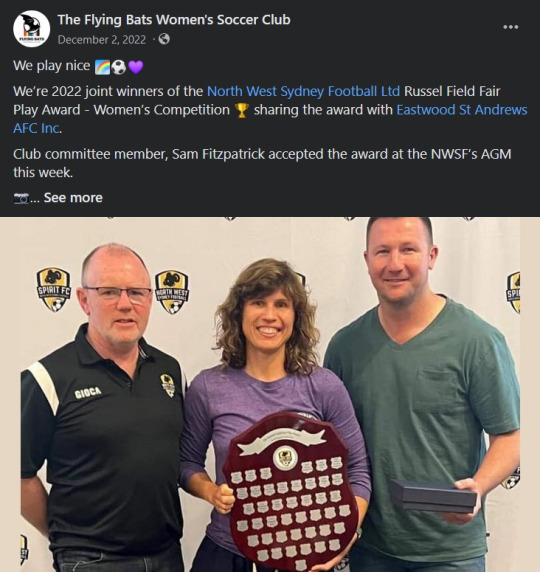
A Flying Bats Club Committee Member accepting a Fair Play award following the severe injury of a female player in 2022.
“Our girls played in Women’s All Age One, where there were no Flying Bats players. We then by winning that competition should have been promoted up to Women’s Premier League, and our girls rejected that. They didn’t want to play up in the women’s Premier League, because there was that Flying Bats team stacked full of male players.”
He continued: “I told the association, no, that I’ve lost a lot of players, and we can’t do that. They said, Okay, we’ll put you into All Age One, which is the next level down, a competition that we won last year.”
In 2022, the year in which a female player for St. Patrick’s FC had her leg broken by a trans-identified male associated with The Flying Bats, club president for the latter group, Jen Peden, was honored with a Fair Play award presented by the NWSFA – a fact announced to the club’s Facebook page with the comment, “We play nice.”
Last week, massive public outcry ensued after news broke of the five trans-identified players on the WPL Flying Bats team. In response, LGBTI Rights Australia, a Facebook community with over 250,000 followers, made a public statement mocking “TERF Nazis.”

“Congratulations to The Flying Bats Women’s Soccer Club who recently won the Beryl Ackroyd Cup! Transgender women have been proudly part of the Bats for 20 years, yet it took TERF Nazis up until this week to take notice,” reads the post. An image accompanying the statement is captioned, “To all the transphobes complaining, we suggest you train a bit harder.”
Flying Bats president Jen Peden told Daily Mail Australia last week: “As a club, the Flying Bats FC stand strongly for inclusion, and pride ourselves on safe, respectful and fair play, the promotion of a supportive community for LGBTQIA+ players, officials and supporters, and the significant physical, social and mental health benefits that participation in sport brings, especially to marginalized members of the LGBTQIA+ community. We are a club that values our cisgender and transgender players equally.”
She continued: “We strongly support the Australian Human Rights Commission’s guidelines for the inclusion of transgender and gender diverse people in sport.”
During the March 20 meeting, which was attended by CEO of Football NSW John Tsatsimas and convened by CEO of NWSF, Matthew Geracitano, attendees were told that a decision to boycott participation by forfeiting matches against The Flying Bats would result in “disciplinary action” being issued.
“If there was a concerted effort by teams to forfeit games against a particular opposition that would be viewed as an act of discrimination,” said Chris Salmon, Chair of the Board of Directors for NWSF. While incidents of discrimination are weighed on a case-by-case basis, possible penalties include suspensions, from as little as two months to two years.
Football Australia’s Anti-Discrimination Policy defines “excluding people on the basis of their sex and / or gender identity status from participation in a competitive sporting activity” as a prohibited form of discrimination.
#St. Patrick’s Football Club#The Flying Bats Football Club#North West Sydney#Australia#Riley Dennis#Save women's sports#Save Women's Sports Saturday#North West Sydney Football Association (NWSFA)#Biological sex is real gender is feeling#Australian Human Rights Commission#Football Australia’s Anti-Discrimination Policy
24 notes
·
View notes
Text
Andy Reid

Physique: Husky Build Height: 6′3″ (1.91 m)
Andrew Walter Reid (born March 19, 1958-) is an American football coach who is the head coach for the Kansas City Chiefs of the NFL. Reid was previously head coach of the Philadelphia Eagles from 1999 to 2012. From 2001 to 2012, he was also the Eagles' executive vice president of football operations. He is the only NFL coach to win 100 games and appear in four consecutive conference championships with two different franchises.

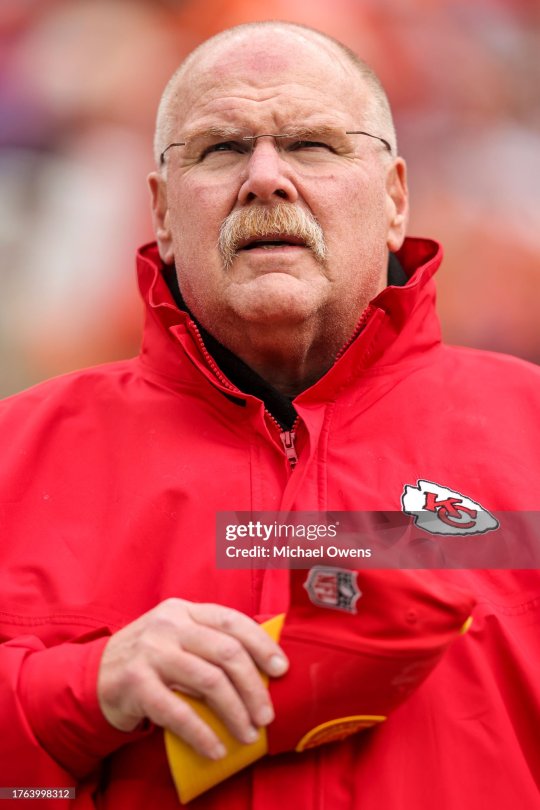



Since being hired as the head coach of the Chiefs in 2013, Reid helped revitalize the struggling franchise into one of the league's best with 10 postseason appearances, eight consecutive division titles, six consecutive AFC Championship Games, four Super Bowl appearances, and three Super Bowl titles.


He kinda reminds of a younger, bigger Wilford Brimley or an older Tim Hooper. Mmm… the things I would do to this man. I won’t go into any details other than they involve my dick. Or my ass. I'm flexible.

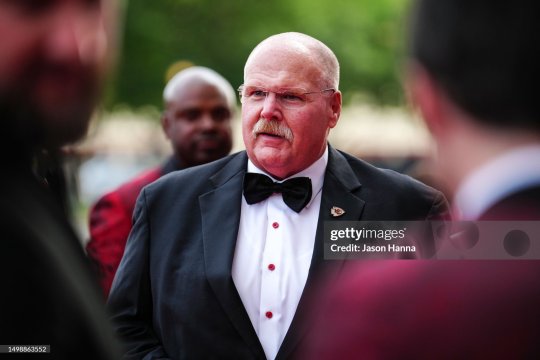

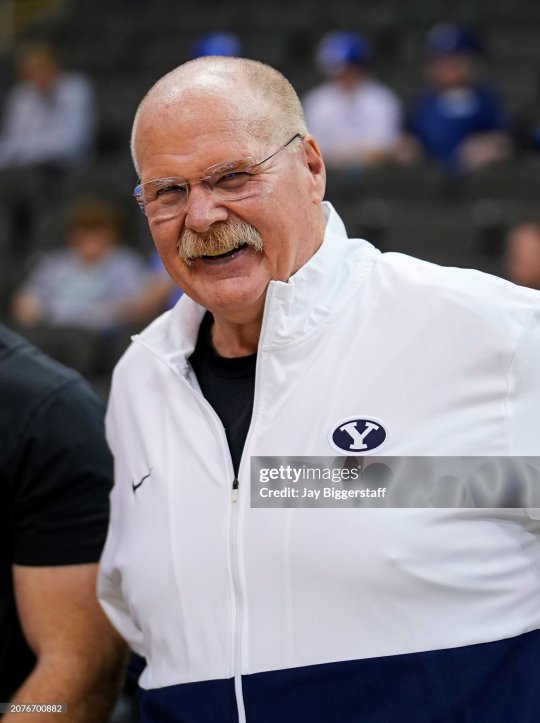

Reid is married with five children, three sons and two daughters. So my "loves to fuck" theory applies. Heavy, older and with a stach you could lose family members in, he certainly ranks as a Daddybear to behold. Reid has appeared in commercials for State Farm with Patrick Mahomes and for Snickers. But I'd prefer him doing underwear commercials where he's drawing a mustache on my face… with his penis.
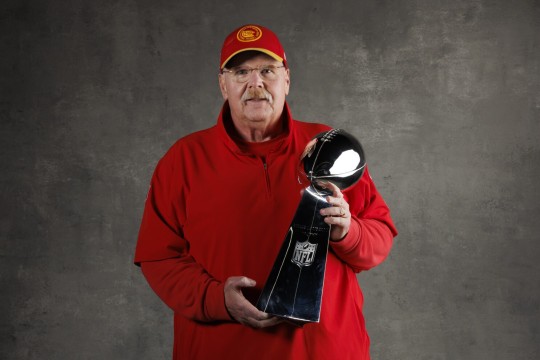
99 notes
·
View notes
Text
nhl x f1 fandom survey results
hello there! about two months ago, @andreisvechnikov and i posted a form meant to gather data from fans on tumblr of both f1 and the nhl so we could take a look at demographics, trends, and then subsequently share interesting corresponding insights.
in total, our form received n = 102 responses — honestly not that great of a sample size for stratifying data by teams when considering that there are 32 nhl teams and 10 f1 teams, so a lot of findings come with a large caveat, but hopefully this post will be interesting to you anyway! (of note is also that all of this data was collected before the nhl regular season began, so hopefully we can rerun this experiment sometime next year when the seasons are running concurrently and see how results have changed then.)
unrelated to our survey, @sergeifyodorov also polled hockey fans on their favorite teams a while back; his results will be referenced as well throughout this post! he was extremely kind and generous enough to send over his data so that we could play around with it on our own, so thank you again for that!!! one last time, please note that our results are not easily comparable because of different sample sizes and team/blog reach (for example: the leafs were heavily underrepresented in our data, but i'm pretty sure it's because the form simply never made its way to that corner of hockeyblr and not because leafs fans are statistically less likely to enjoy f1 LOL...)
without further ado:
DEMOGRAPHICS
"Where do you currently live?" + "How old are you?"


out of 102 participants, an overwhelming amount — 85.3% — live in north/central america or europe, and most respondents were also between the ages of 18-25. since the nhl is based in north america and f1 teams are (mostly) based in europe, i was curious to see how fandom trends varied across these two demographics specifically.
EUROPE VS. AMERICA
"Do you consider yourself more of an F1 or hockey fan?"

interestingly enough, 2 in 3 of the european respondents said that they like or follow hockey more, with only 15.15% preferring f1. asian and north/central american fans were a little more evenly split, with 38.9% north/central american fans saying they liked f1 and hockey about the same. however, altogether 89.2% of global respondents said that they prefer hockey OR that they like both sports about the same, so it seems that fans in our survey skew more toward hockey in general.
"Do you follow any top-division hockey leagues outside of North America?"
again, since f1 is primarily based in europe and since europe boasts a huge hockey market outside of the nhl, this question was aimed at understanding interest in other top-division hockey leagues outside of north america. more specifically — not anything like the ahl or ncaa but instead leagues like the shl and liiga.
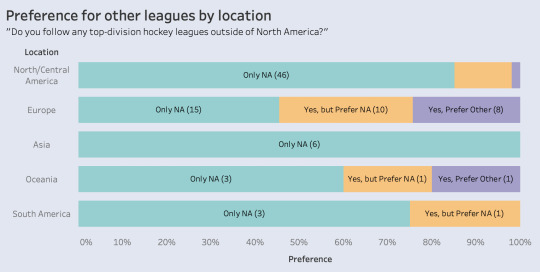
the majority of the respondents who said they followed top-division hockey outside of north america were, unsurprisingly, based in europe, with over half (54.5%) claiming to follow other leagues and 1 in 4 (24.2%) preferring these to north american hockey.
as for north/central american respondents, a large majority — 85.2% — claimed to not follow any leagues outside of north america. here were the leagues mentioned at least twice:
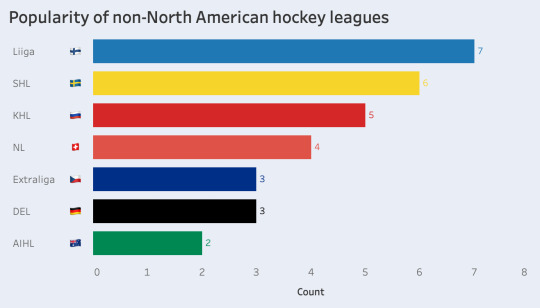
"Do you follow professional leagues for any of these following sports?"
for this question, we gave several multiple-option choices of obvious sports and also allowed respondents to submit their own answers if we missed any. here were the most-commonly followed professional sports outside of f1 and the nhl, filtered to at least 2 responses:

interestingly, football and baseball were on par at 26.5% — or about 1 in 4 — each, although the most common response was actually none; 37.3% of respondents said they only watch hockey and motorsports for professional sports. the sports that received one vote each were: volleyball, tour de france, swimming, pro wrestling, gymnastics, figure skating, cycling, climbing, and australian rules football.
TEAM POPULARITY
NHL STATS
"What is your favorite NHL team?" + "If you like multiple NHL teams, feel free to name any others below." (<;- capped at 3)
in order to rank each team — despite different voting methodology and sample sizes from both surveys — i normalized a popularity score based on a weighted value, composed of how many people voted for it as their favorite team and then how many people mentioned it in the "other teams i like" question. each team was then graded relative to the top team, in our case dallas and in cody's case pittsburgh.
in the table below, the numbers in purple correspond to our survey and the numbers in grey show cody's results as reference. as you can see, toronto is very underrepresented in our data, while dallas is considerably more popular and tops the chart. 3rd-place vancouver was also our most commonly mentioned "other" team with 19 votes, despite only being 6 people's favorite team.

does this mean that fans of both f1 and hockey are statistically more likely to enjoy dallas than your average hockey fan? or does it just mean that i'm primarily a dallas stars blog and this was the audience i accidentally reached when sharing my survey? (most likely the second) the world may never know!!!
another way of looking at the popularity differences across both surveys is with a little scatter plot. same data, just different presentation!
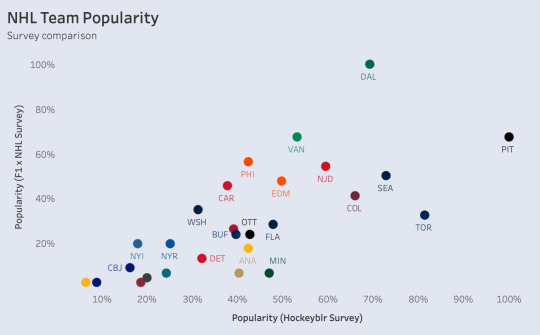
F1 STATS
"What is your favorite F1 team?" + "If you like multiple F1 teams, feel free to name any others below."
not much that needs to be explained here — mercedes and ferrari were far and away the favorites, but red bull and mclaren were also fairly popular! the least popular team of all was haas, with only one person mentioning it as a team they liked and no one voting for it as their favorite team.

interestingly enough, 1 in 3 (34) of respondents said that they had no favorite team at all, with this response scoring higher than any single team (mercedes only had 21 "favorite" votes, although it had 36 total responses). this was a large contrast to the nhl results, where only 6 people answered none for their favorite hockey team — meaning that 94.11% of respondents claimed a favorite nhl team!
(perhaps this means that f1 fans are less likely to be loyal to a team and instead prefer to follow drivers' individual careers, or that team allegiances are simply stronger in hockey fandom. or maybe not! who knows.)
something else i was curious to see concerning the most popular teams was another location distribution, although this time i didn't want to simply calculate percentages straight-up since we already know that the global distribution skews mainly toward north/central america and europe. because of this, i filtered only teams that had n >= 10 votes and calculated the difference for each percentage from the global average, so i could see which teams were more biased toward a location than "expected."
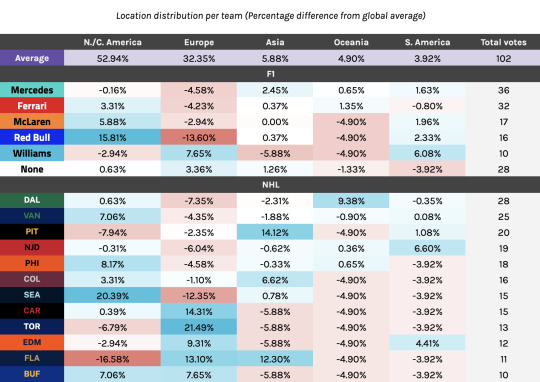
for f1: ferrari, mclaren, and red bull all had slightly higher american interest than average, with red bull especially skewing lower on the european side.
for hockey: dallas had higher than average interest in oceania, with pittsburgh scoring higher in asia and seattle being especially strong in north/central america (and thus less so in europe). toronto, carolina, and florida also had higher support in europe.
(note again that these are very small sample numbers, especially for teams with less than 20 votes!)
+ just for fun, here's how the top 4 other sports (football, baseball, american football, and basketball) skewed location-wise.

probably not much of a surprise here, although interestingly europeans were more likely than americans to say they only followed motorsport and hockey.
PLAYER / DRIVER POPULARITY
"Who are your favorite NHL players?" + "Who are your favorite F1 drivers?"
when it came to calculating the most popular players, we asked that survey respondents list up to three of their favorite players, then assigned 3 points to the first player, 2 to the second, and 1 to the third. using this weighted count, i ranked drivers and players using a normalized score.
86 unique nhl players were mentioned for this question. out of them, 84.9% (73) are still actively playing in the nhl. the most popular active players were sidney crosby and quinn hughes, while the most popular inactive player was paul kariya, with 2 mentions and a score of 11.76%.
using the same process, 39 unique f1 drivers were mentioned for this question, this time with 95% (19/20) of the current grid being represented — the only driver not mentioned a single time was nico hülkenberg. the remaining 20 drivers were either retired or reserve drivers. lewis hamilton was far and away the most popular driver in this survey, while the most popular inactive driver was 3rd-placed sebastian vettel with a relative score of 61.18%.
here are the top 25 for each sport alongside their corresponding teams:
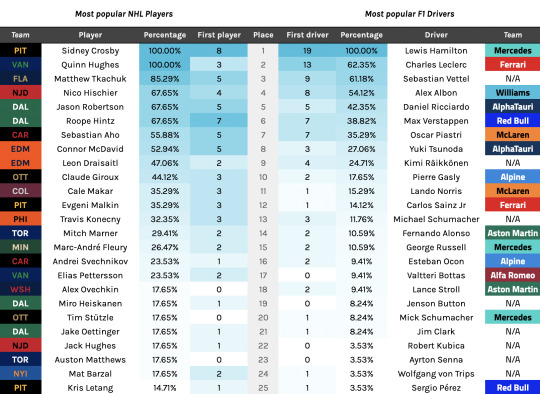
as you can see, the most-represented team in the nhl top-25 is dallas, with 4 players (robertson, hintz, heiskanen, oettinger) making the cut! other teams to have at least 2 athletes in the top 10 are edmonton for the nhl and alphatauri for f1.
F1 X NHL CROSSOVER
this was the main reason we created this survey in the first place. our burning question was: Which F1 teams do fans of certain NHL teams tend to like — and vice versa?
in order to calculate this, i mapped all the nhl teams each respondent voted for to all the f1 teams they voted for, assigning 1 point to each. so if someone had a favorite team and named three "other" liked teams for each sport, that would be 8 points on the matrix altogether. i then filtered out any nhl team that had less than 20 total tallies for f1 teams and created the chart below:
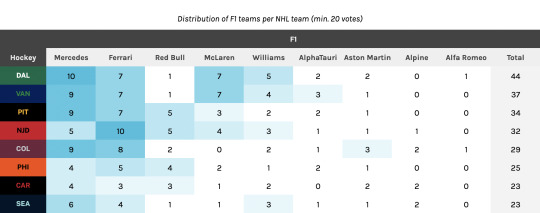
i also removed "none" votes since i was more interested in the distribution of interest strictly across f1 teams. finally, i filtered out the f1 teams with negligible amounts of votes and created another percentage chart relative to the global average (since we "expect" mercedes and ferrari to be most popular overall):
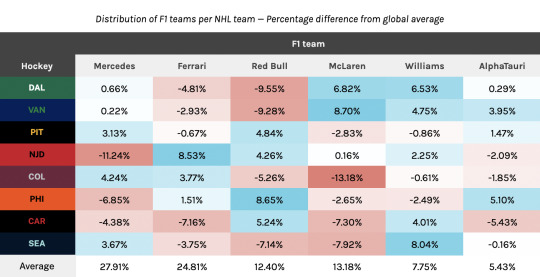
some summarizing thoughts:
DAL and VAN fans were both less interested in red bull and ferrari and more interested in mclaren and williams
NJD and PHI both voted less for mercedes; the former preferred ferrari and the latter red bull
CAR didn't have huge discrepancies across the board, but skewed a bit toward red bull and williams
COL had the lowest relative interest in mclaren of all teams, while SEA had the highest relative interest in williams
again, these sample sizes were pretty small so maybe it means nothing at all. i'd love to run this survey again with more responses and maybe also restrict the team choices to only 1 favorite + 1 other team per sport in order to really drill down into people's preferences, but hopefully this is interesting anyway!
FANDOM ORIGINS
i always love learning about how people got into a fandom, so we also asked respondents how they got into f1 and hockey, with the following options being provided:
Grew up around it/Family
Hockey or F1 RPF
Introduced by friends (online or IRL)
Discovered individually through fandom content (gifs, YouTube, podcasts, etc.)
Hockey books & romances (Hockey)
Drive to Survive (F1)
Other films, documentaries, etc.
3 respondents clarified that they specifically discovered hockey through reading the webcomic check, please!, but i decided to implicitly include this in the "hockey books" category. a few of the "other" options for hockey also specifically mentioned the olympics.
here was the distribution of responses, noting that the question was multi-option so there is overlap:
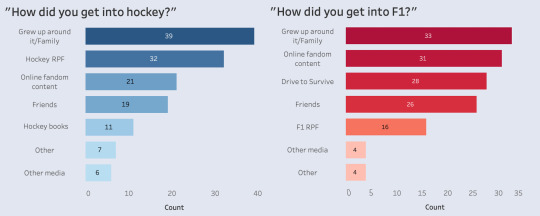
i also made a side-by-side bar chart to note differences between f1 and hockey origins. in this case, i paired "hockey books/romances" with "drive to survive," since i see them as the two biggest respective examples of mainstream media movements for each fandom (around social media/rps spaces i should say), the former being mainly based in booktok.

as you can see here, a considerable amount of fans got into f1 through dts (1 in 5). in terms of fanfiction, hockey rpf was a lot more influential in getting people into hockey than f1 rpf was in getting people into f1 (23.7% vs. 11.3%). lastly, hockey was also slightly more common as a childhood/family sport than f1, although only by a few percentage points — 28.9% of fans grew up with hockey and 23.2% grew up with f1.
of course, i couldn't end this question without doing another location analysis, which gave some interesting results:
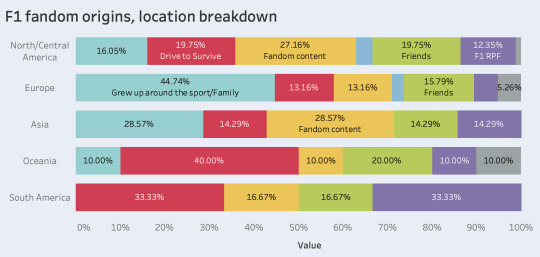
for f1, the overwhelming majority of european respondents said that they grew up around f1 or were introduced to it by family — 51.5%, or over half (the chart says 44.7% because of multi-option overlap). in contrast, only 24.1% — or 1 in 4 — of north/central americans said this. their results were much more evenly split in general, with drive to survive and fandom content ranking considerably higher.

for hockey, the distribution actually looked quite similar between north/central americans and europeans, although americans ranked a little higher in terms of growing up around the sport. it's pretty much the same though — the main difference is that a good chunk of the "other" votes for the europeans specified getting into hockey through the olympics. altogether, respondents from asia, oceania, and south america mostly discovered hockey through a mixture of rpf and hockey books, although these are very small sample sizes so not fully reflective of overall experiences.
OTHER MOTORSPORTS
"What other motorsports do you follow?"
we were also interested in knowing what other kinds of motorsport people liked.
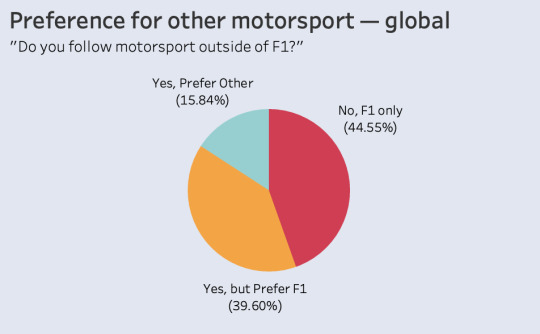
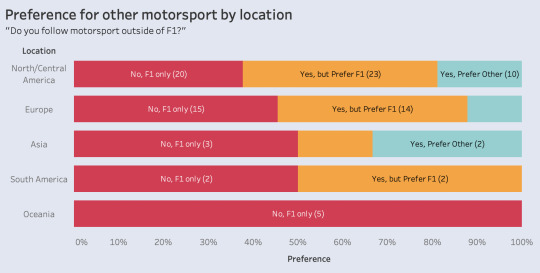
interestingly, north/central americans had the smallest proportion of f1-exclusive respondents, with 37.7% saying f1 is the only motorsport they follow. here were the series that received at least 10 votes:
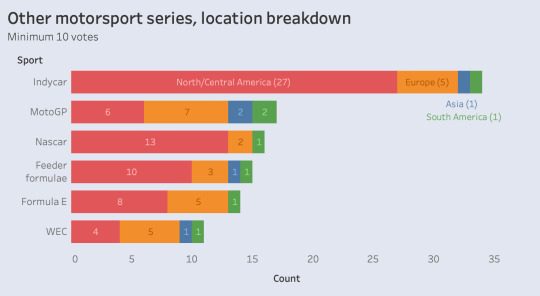
indycar was by far the most popular "other" motorsport series, with motogp, nascar, and general feeder formulae (f2, f3, etc.) faring well too. unsurprisingly, you can also tell at a glance that there is overwhelming american interest in indycar and nascar compared to other series!
CONCLUSION
that's about all we've got at the moment. if there's anything else you'd like to see more of, or anything you're confused about/think doesn't make sense, feel free to reply to this post or shoot me an ask :') thank you again for reading and i hope you enjoyed this little post!!! 🥲❤️
38 notes
·
View notes
Text

Franz Beckenbauer, who has died aged 78, was widely regarded as the best footballer Germany has ever produced. A pre-eminent figure in the world game after the second world war, he was a phenomenally innovative player who captained West Germany to a World Cup win in 1974 and later managed his country to two consecutive World Cup finals, winning the second of them in 1990 in Rome.
As a club manager he added a Bundesliga title and a Uefa Cup win to his World Cup victory at international level and as a player he won a World Cup, a European Championship, three European Cups and five Bundesliga titles in Germany. However, more than his capacity for winning, it was the elegant, intelligent nature of his play that attracted such admiration all over the world.
While he was still a teenager at Bayern Munich, Beckenbauer had become the virtual inventor of what came to be called “total football”. Watching the Milan team Internazionale on television, he was impressed by the attacking forays of their big left-back, Giacinto Facchetti. He asked himself why a defender might not attack from a central role as well as from the flanks, and thus became Bayern’s attacking libero. It was a role that became the cornerstone of the total football practised by Bayern and their great Dutch rivals, Ajax, in the early 1970s.
Captained by Beckenbauer – a tall, erect figure always ready to sweep out of defence – Bayern at first played second fiddle to Ajax, but eventually emulated them by winning the European Cup three times in a row, between 1974 and 1976. Before that sequence Beckenbauer had already captained an outstanding West Germany team to the European Championship title in 1972, beating the Soviet Union 3-0 in the final. Two years later he led his country to victory in the 1974 World Cup on German soil, defeating the Netherlands 2-1. He played 103 times for West Germany and appeared in 427 league matches for Bayern.
Franz was born to Antonie (nee Huphauf) and Franz Sr, a postal worker in the Munich suburb of Giesing, near the stadium where he would make his name. By the age of eight he was already regarded as a technically accomplished player, even in a city where footballers and football proliferated. Munich 1860 was the club he favoured; Bayern Munich, where he would later excel, were small beer at the time; an upstart by comparison.
However, Munich 1860’s loss would be Bayern’s gain. In 1958 he was playing for the junior team of a little local club, SC 1906, which actually closed that year, and expected to join 1860. “But in the last game we played for SC 1906 against 1860,” he related, “a half-back gave me a slap. That was enough for me. 1860 would never get me. And so Bayern took me into its ranks.” Beckenbauer was, with rare exceptions, always a sporting player, who declared that he would rather be fouled and leave the field than commit a foul himself.
He made his debut for Bayern Munich in 1964 – when they were in the German second division – and in his first season helped them gain promotion to the Bundesliga.
Thereafter Bayern rapidly became a major force both at home and in Europe, winning the German Cup in 1966–67 and the European Cup Winners’ Cup in 1967 (against Rangers). Beckenbauer was made team captain for the 1968–69 season and led the club to its first league title that year, subsequently winning three league championships in a row from 1972 to 1974 and that hat-trick of European Cup wins in 1974-76.
Under his leadership (he was nicknamed the Kaiser for his commanding, almost imperious presence) the Bayern team of that era, which also featured greats such as the goalkeeper Sepp Maier and the centre-forward Gerd Müller, established itself as one of the most accomplished club sides of all time.
Beckenbauer’s first game for the national team, at the age of 21 in 1965, had come even before Bayern’s dramatic rise to prominence. He was the star member of the West Germany side in the 1966 World Cup finals, where they were runners-up in the Wembley final to England, and again in the 1970 finals in Mexico, where they finished in third place.
Helmut Schön, the tall, gentle West Germany team manager who was almost a father figure to Beckenbauer, for many years refused to let him play the libero role for his country. When he finally relented in 1974, West Germany won the competition and Beckenbauer lifted the trophy as captain.
All seemed set fair for a fourth World Cup campaign for Beckenbauer in Argentina in 1978, but to general surprise, and aged only 31, he retired from international football in 1977 to switch to play for New York Cosmos in the North American Soccer League.
It was an unusual move after almost 15 years at the highest level of the game with Bayern, but the contract was lucrative and enormous crowds came to see him play with Pelé and other stars at the Giants Stadium, New Jersey.
In his four seasons with the Cosmos the team won the national Soccer Bowl on three occasions (1977, 1978 and 1980). “I’ve done everything in my life – championships for Bayern Munich and the World Cup for Germany – but the New York Cosmos was the best time of my life,” he said. “At Munich it was all German players; at the Cosmos it was 14 nationalities and Pelé.”
He returned to Germany to play for Hamburg (1980-82), where he picked up another Bundesliga winners’ medal at the end of the 1981-82 season before going back to the US for one final campaign with the Cosmos in 1983 and then retiring. In his career in domestic leagues he had made 587 appearances and scored 81 goals.
When Beckenbauer retired he seemed to have no ambition to go into management, so it was a surprise that in 1984 he agreed to manage West Germany in succession to Jupp Derwall. Never before had a West Germany manager been appointed who had not come through the exhaustive qualifying programme of the German football association, one which involved not only the passing of examinations but the running of minor clubs.
In appointing Beckenbauer, the German authorities were abandoning firm principle in the hope that his immense prestige and authority would prevail; and they were not disappointed.
The team he inherited was in the doldrums, yet at the 1986 Mexico World Cup, suitably inspired, they reached a final in which they were plainly inferior to an Argentina team that went into a 2-0 lead, only for the Germans to fight back, catch them up, and then lose 3-2. Four years later, in a grisly final in Rome, Germany had their revenge, beating Argentina 1-0 with a penalty by Andreas Brehme.
Shortly afterwards Beckenbauer resigned his position to became technical director of the French club Marseille on a two-year contract worth nearly £500,000, taking a German physical trainer with him. But for once his writ did not run. The French players were unhappy with the training regime and Beckenbauer withdrew after just four months.
He was far happier when he returned to Bayern Munich to serve as manager over two short spells – in 1993-94 and in 1996 – during which time he collected two further honours, the Bundesliga title in 1994 and the Uefa Cup in 1996. Thereafter he was president of the club for two years.
In 1998 he became vice-president of the German football association and at the end of the 90s headed the successful bid by Germany to host the 2006 World Cup, chairing the subsequent organising committee. He was named honorary president of Bayern Munich in 2009, a position he held until his death.
His son, Thomas, with Ingrid Grönke was born in 1963. In 1966 he married Brigitte Wittmann. They had two sons, Michael and Stephan. Following their divorce in 1990, he married Sybille Weimer; they divorced in 2004. With his third wife, Heidi Burmester, he had two children, Noel and Francesca. Stephan, who was also a footballer and played for Bayern Munich, died in 2015. Franz leaves Heidi and his four other children.
🔔 Franz Anton Beckenbauer, footballer, born 11 September 1945; died 7 January 2024
Daily inspiration. Discover more photos at Just for Books…?
23 notes
·
View notes
Text

Patrick Lavon Mahomes II (September 17, 1995) is a football quarterback for the Kansas City Chiefs. The son of former Major League Baseball pitcher Pat Mahomes, he played college football and baseball at Texas Tech. Following his sophomore year, he quit baseball to focus solely on football. In his junior year, he led all NCAA Division I FBS players in multiple categories including passing yards (5,052) and total touchdowns (53). He was selected 10th overall by the Kansas City Chiefs in the 2017 NFL Draft.
He played college football and college baseball at Texas Tech University. He entered the 2017 NFL Draft where he was the tenth overall selection by the Kansas City Chiefs.
He spent his rookie season as the backup to Alex Smith. After the Chiefs traded Smith to the Washington Redskins the following season, he was named the starter. He threw for 5,097 yards, 50 touchdowns, and 12 interceptions. He became the only quarterback in history to throw for over 5,000 yards in a season in both college and the NFL. He joined Tom Brady and Peyton Manning as the only players in NFL history to throw at least 50 touchdown passes in a single season. For his performance in his first season as a starter, he was named to the Pro Bowl, named First-Team All-Pro, and won the NFL Offensive Player of the Year and NFL MVP awards. He, along with Lamar Jackson, Cam Newton, and Steve McNair, is one of only four African American quarterbacks to win the AP MVP award. During the 2019–20 Playoffs, he led the Chiefs to Super Bowl LIV, their first Super Bowl appearance and victory in 50 years. He led the Chiefs to their second consecutive Super Bowl. He won his second career NFL MVP and his second Super Bowl MVP in Super Bowl LVII, becoming the first player to win NFL MVP and Super Bowl MVP in the same year, and the third quarterback to win multiple regular season and Super Bowl MVPs.
He married Brittany Mahomes (2022) and they have two children. #africanhistory365 #africanexcellence
5 notes
·
View notes
Text
Domi interview, part 3
Dominik says the biggest differences from going to playing in the Bundesliga to the PL, are pace and decision making.
D: "You get the ball, then you have 2 seconds to make a decision, in the Bundesliga you had 4. Every match is a life or death situation. Every team can beat the other, and this is what it's so great about it [the PL].
About how beefed up Salah got ever since his shoulder injury in Madrid, if working out like he does, strengthening core muscles are expected of everybody, or it's a plus they can decide to do:
The interviewer basically goes on a monologue about how muscular and strong Mo is. He seems very impressed, retelling how Mo works out, how strong he is and wonders if the special workouts he seems to do is what makes him avoid injuries. He asks Dominik about his opinion, if he too, believes in putting in the extra work, like Salah does.
D: "Nothing is obligatory, we don't have a gun to our heads to work out in the gym. Everyone does it for themselves. He [Salah], yeah, it's true all what you said. I talked a lot about to him about this, asking questions, because I was interested. He said, until he was like 28 years old, he didn"t do this (...), then he decided to cut out pasta, bread, sugar (...). He made his decision, and ever since, like even if we have training at 12, he is at the gym by like 10."
I: " And what about you, what do you think, do you do this or not (...)?"
D: "Everyone is different. I do my own things, this [what Mo does] is I think not what I need. I have tried it, being very strict about food (...), but I didn't feel better. I felt very anxious, that I had to restrict myself, I didn't feel free, didn't feel like I was able to do things freely. Now, if I feel like eating some chocolate, then I will eat it. He [Mo] thinks different."
About how much work he brings to his private life, if he watches matches in his free time, things like that:
D: It's hard still. I'm trying to build this habit up, that when I come in the door, I leave work behind, and when I leave the house and go to training it's all about football (...) But it's hard. (...) I very rarely watch matches, usually only when one of my friends play. I have a friend, who now plays in the NB2 (the Hungarian Second Division), sometimes I watch that on Youtube.
I have a friend group of 5 people, we do a shared call, than watch the friend's match on the TV."
I: "Do they do the same with you?"
D: "Sometimes it doesn't work out, but yeah, they all watch my matches too."
About playing style of RB Leipzig vs Liverpool
The interviewer goes on about how Klopp changed his tactics up a bit, after Liverpool became the champion, back then it was less direct, but now it's so direct, all about gegenpressing, there are so many balls going forward, meaning there are many, which "come back too". [It's all about counter pressing.]
D: "I can't really compare the two teams, it's a different league, different players. The coaching mindset is different too, even if Klopp and [Marco] Rose are quite similar choaches."
I: "And then there is Jesse Marsch, [Klopp and Rose] basically on steroids." (lol)
D: "You get the ball, long ball/long pass, then shuhsu. [makes a sound to go forward]
But, basically, the last season for Liverpool was kinda bad. So, he [Klopp] thought, let's twist it all up. We will go for every ball, we will get every ball, then when we have it, we will go forward. Not in a stupid way, of course, if we can't go forward, then we keep the ball, twist it around (...). There is [tactical] football, it's not get the ball forwards." [basically saying not hoofball]
I: "You are someone, who rather keeps the ball, turns it around in the sides..."
D: "Before the match against Everton, in training there was a situation, when we were playing, running for like 5 minutes, and I kept the ball, passed it back, said that why aren't we going forward? Then, the others told me, we are not going forward, because we have been running for 5 minutes, let the opponent run some, while we keep the ball."
I: "It was reported, that when TAA started inverting to midfield, he would find this information [if he has to do this or not] a day before the match. This seems ??? (sorry, for some reason I cannot understand what he says). Is it the same for you, because sometimes you play as a 6, mostly when you are down to 10 men [Dominik chuckles at that], it seems your position on the field changes a lot. How soon do you find this out?"
D: "Our positions are discussed in the training before the match. But everything can happen, so it does change a lot."
I: What did Klopp tell you yesterday [in the game against Everton] at the 61th minute, when he called you over to you at the side of the pitch? Everton was very deep by then, defending 5-3 basically, leaving no place left in the midfield. Do you remember what he said (...)?"
D: "He told me to go forward, to be closer to Jota. If there is a ball, shoot."
I: "In Leipzig and the NT too, you are right in front of the pitch with the ball [meaning that he had the time and space to attack, move the ball], but now, you are playing as an 8, where you have seconds to find space between the lines, it's all very quick. Which styling play you prefer (...)"
D: " I don't like to play backwards to the net. I feel like I'm someone, who can see things, when facing the net, which others may not. It's an advantage I try to use as much as possible, to give myself a bigger space from the people, then I try 1 vs 1, or either with passes, but if I have to play between the lines, then I will do that."
I: "Do you have any preference where to play? [position vias] You said you like to be in front of the net, but sometimes, as an attacking 8, that's not possible."
D: "It depends on how I position myself. Whatever position I play, I can position myself in a way that it works out for me. I don't mind if I have to play deep, what matters to me is that I can turn, and see everything in front of me. Not when I get the ball, and there are people breathing down in my neck. I don't like that."
I: "But that happens a lot lately. (...). Sometimes you have to play as a double pivout."
D: " Yeah, it happens, when we feel like we can't get through them. Then, Trent goes to the right wing, and then Mac Allister and I can deal with the rest."
The interviewer then mentions the problems Trent faced last season, that Henderson used to help him out. Question that when he has to do the same [cover for Trent, when he inverts into the midfield] how automatic it is, if it comes naturally, or it's something Klopp drilled into him.
D: "No, it comes naturally to everyone, I think. If you see your RB struggling, you will go and help them. I'm not a good defender, but I know what I have to do in that 1,5 min I'm there."
Question about the connection between Klopp and Pep. He said, and it was reported as well, that he [Pep] invented this new position of TAA, and sometimes it's him who is in charge of the training too. Who comes up with the tactics, who tells them (...).
D: "We don't know who comes up with the tactics. Klopp is the one who tells us, and it's only him, who does the training before the match. Other trainings, Pep does it sometimes."
Question about Dominik's feelings and impression of Pep.
D: "He is good. I love him. He listens to everyone, we all listen to him. It's great to work with him."
About Haaland.
Haaland said his superpower is regeneration. Examples how he tapes his mouth, things like that. "He is a machine, a robot, says that about himself as well." Question if Dominik believes in the same stuff as well.
D: "I don't judge (lol), everyone does what they think it's the best for them. Back in Saltzburg, I meditated with him a few times, because we shared a room. First, I thought it was stupid, then I joined him, because why not. He used to wear those blue light glasses, I tried that one out too, he said it would help me sleep better... Well, you can only guess, if it worked out I would be wearing them still. It didn't help me. Maybe it didn't work out for me, because I didn't believe in it. He does a lot of other [regeneration] stuff, that people don't know about. I have been in his place, yeah it's a lot. He is a bit strange. [laughs]"
Short questions:
I: "Do you prefer heavy metal football or a possesion-based, slower stlye?"
D: Both, it depends. Maybe I prefer when I have the ball, and it's the opponent who has to run, not me, even if I can.
I: DC or Marvel?
D: Marvel.
30 notes
·
View notes